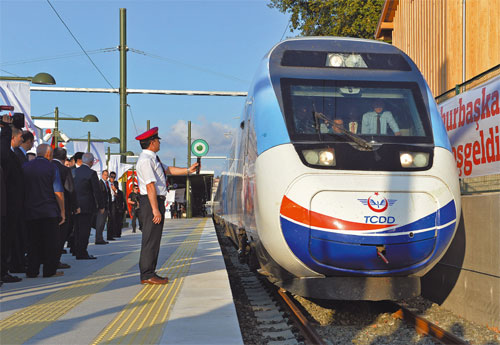Diplomat: Nation a bridge in Belt and Road
Ambassador says modern routes will spur growth in economy and create jobs for Eurasian nation
Turkey is an "important partner to implement" China's Belt and Road Initiative and is ready to play an active part in the proposal, said China's ambassador to the country.
Yu Hongyang, China's ambassador to Turkey, told Xinhua News Agency in a recent interview that Turkey stood at a key location along the ancient Silk Road, its special geographic location forming a bridge between the East and West.
"Turkey is an important partner to implement the Belt and Road Initiative," he said.
Proposed by President Xi Jinping in 2013, the Silk Road Economic Belt and the 21st Century Maritime Silk Road, later dubbed the Belt and Road Initiative, aims to revive the ancient trade route between Asia and Europe.
The modern route would thread through more than 60 countries and regions with a total population of 4.4 billion.
Over the past few months, China has made greater efforts to advance the initiative, earmarking $40 billion for a Silk Road Fund to support infrastructure projects along both modern routes.
Beijing's Belt and Road Initiative coincides with Ankara's Silk Road development plans, said Yu.
Since its proposal, Turkey has officially backed the new Silk Road proposal. In December 2013, then Turkish Foreign Minister Ahmet Davutoglu, during a visit to China, told Chinese media that his country is a natural supporter and would be an active participant in the Belt and Road Initiative.
Last November, Turkish President Recep Tayyip Erdogan told Meng Jianzhu, a member of the Political Bureau of the Central Committee of the Communist Party of China and Xi's special envoy, that Turkey will fully support Beijing's initiative and would like to boost bilateral cooperation to higher levels within the framework of the trade route proposal.
Yu said trade relations between the two countries are currently progressing, while the Belt and Road Initiative has provided a broader platform for the two sides to promote bilateral cooperation. He added that enterprises from the two nations have already gained benefits from the proposal.
He cited a number of Chinese firms, Hainan Airlines, Huawei and CRRC Corp among them, who have recently invested in Turkey in the transportation, energy, telecommunications, mining and tourism sectors.
In July 2014, one section of a railroad linking Ankara and Istanbul that was constructed by a Chinese company became operational, boosting tourism and logistics along the rail line.
The two countries have also expanded their cooperation in the financial sector. Late last month, China's Industrial and Commercial Bank of China Ltd, the world's largest bank, completed its acquisition of Tekstilbank from Turkey's GSD Holding, making it the first business institution operated by a Chinese bank in the country.
Yu said that as the two nations work to advance the initiative, their cooperation will lead to a growth in jobs for Turkey's people and spur growth in its economy.
In March, Beijing detailed its proposals in an action plan for the major initiative.
According to the document, Beijing intends to better coordinate cross-regional cooperation with foreign governments, build up a network of infrastructures to intertwine the economies of Europe, Africa and Asia, promote trade-friendly policies and expedite financial cooperation like currency exchanges. These measures would be undertaken within new financial bodies including the Asian Infrastructure Investment Bank, the BRICS development bank and the Silk Road infrastructure fund.
These aims would bring substantial revenue to countries along the Silk Road, including Turkey. He went on to say that the Belt and Road Initiative, once enforced, would better facilitate trade, bring about stronger financial support and create more convenient transit infrastructure to countries sitting on both sides of the routes.
As for Turkey, the Chinese ambassador said, the initiative would make the country an even more important pivot between the East and West. The initiative can also boost cultural and people-to-people exchanges between China and Turkey, he said.
He said the two countries over the past few years have hosted many successful events, including book fairs and education exchange programs, adding that the number of Chinese traveling to Turkey has been growing steadily.
Yu said the principle proposed by Xi that calls for a "community of common destiny" will serve as a guideline for China as it develop its relations with Turkey and other Middle Eastern countries.
The principle emphasizes dialogue and cooperation rather than confrontation, he said, adding that China will work with Turkey and other countries in the region to promote peace and end conflicts through diplomatic talks.
|
The first high-speed train built by a Chinese company overseas begins operation on July 25, 2014, in Turkey. The rail line links Ankara, the capital of Turkey, with its largest city Istanbul. lu Zhe / Xinhua |
(China Daily 07/30/2015 page6)















